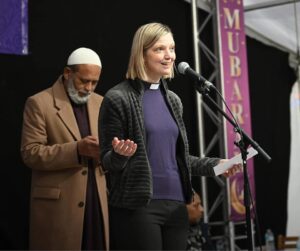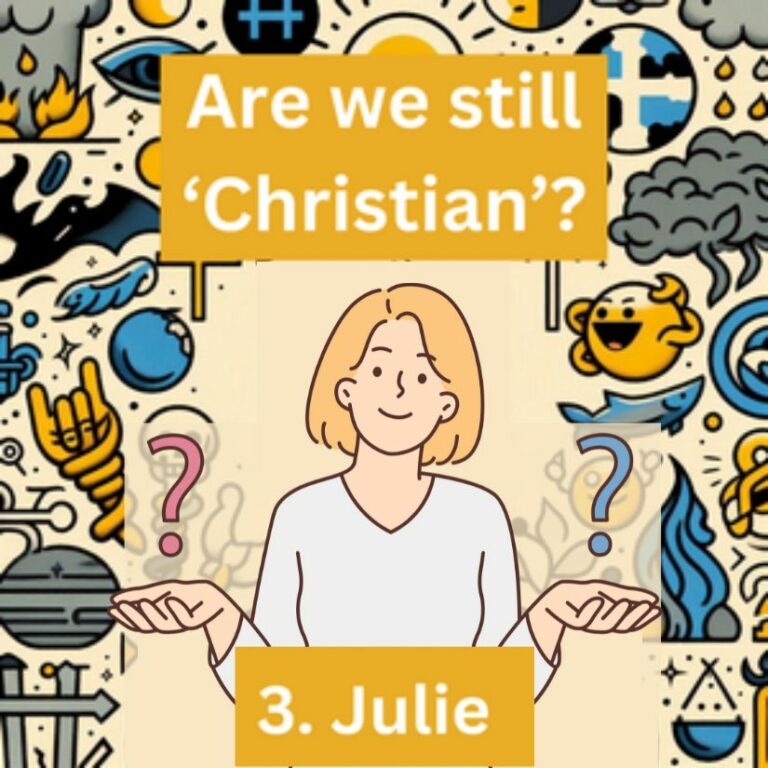This short blog series was initially inspired by the arguments surrounding the inauguration of Donald Trump and the homily given at the National Cathedral by Bishop Mariann Budde. Simon began the series by posing the question and giving his views, then Craig responded in the second instalment, and now it’s my turn. I’m not an experienced blogger, but I’m giving it a go here to try to articulate some of my thoughts on the question.
For those of you who don’t know me, I’m the minister of a small local Baptist church which serves a couple of small towns in the North of England. So you might think that it’s pretty straightforward for me – I have chosen to follow Jesus, and my role involves helping people think and learn about him, and encouraging those who want to respond to the amazing love and grace of God to follow him too.
Surely then, I must be comfortable to call myself a Christian?
You might even say I’m a ‘public’ or ‘professional’ Christian, although being a ‘professional Christian’ makes it sound like I find it easy or I am the finished article – and I need to tell you that’s not the case! I know that I am a Work in Progress, and I am on a lifelong journey of faith. Although I came to faith in Jesus over 40 years ago, I still have a lot to learn and discover. l am trying to follow Jesus in my own life and as a church leader, and I have the privilege to share some of that journey with a great community of people.
Despite having a public-facing role as a church leader, I’ve still wrestled with this question. I agree with Simon and Craig when they say that the brand of Christianity that Trump represents is not something I want to be associated with. Like them I have moved away from using the ‘evangelical’ label as it has become associated with being a Trump-supporter – I’m not THAT sort of ‘Christian’.
The question posed by Simon is not a new question. Sadly, there are many examples throughout history of Christians (or groups of Christians) using their power to dominate others. This includes, but is not limited to, the abuse or exclusion of children, women, people of colour, people who identify as LGBTQ+ or those with a disability. All this make me uncomfortable with the ‘Christian’ label.
I’m much more willing to be known as a follower of Jesus. Throughout the gospels we see Jesus rejecting power and the ways of domination. He frequently spent time with those society excluded or rejected, often eating with them and receiving hospitality from them. So it’s interesting that as I thought about this question, a recent event came to mind…
For the last couple of years, there has been a Community Iftar in our town. An Iftar meal takes place at sunset and breaks the fast of Ramadan. A local takeaway provides the food, while the Town Council arranges tables and chairs in the Town Square. Everyone is invited to come and share the meal. The organisers invite a church leader to speak as people gather, and last year I was honoured to be asked. After thanking those providing the food, I spoke briefly about the similarities between Lent and Ramadan; both are times of prayer and fasting.
Every year, when I attend, I wear my clerical collar—a practice rare for Baptist ministers—because I think it is important that people recognise me as a follower of Jesus, and as a church leader.
Table fellowship — sharing a meal together — highlights our commonalities. The Community Iftar is an emotional occasion that provides space for people of all ages and different faith perspectives to connect and share their humanity. It is a sign of mutual respect, friendship, and love for our neighbours. Given the current state of the world, this year’s gathering embodied a message of peace in our town, which I hope rippled out into the broader global community.
(For a local news report about the Iftar, follow this link: Lancashire Telegraph)

When I spoke at the meal, I reminded people that Jesus said, “Blessed are the peacemakers…”
There is a blessing to be found in attending this special community meal. This is the sort of event where I want people to know I am a ‘Christian’ because it is a place where I learn more about giving and receiving hospitality, and I experience and observe the impact it has on a community as we come together in an act of kindness and generosity. As a church leader I want to communicate that this is a safe place for Christians to be – we can receive hospitality from our Muslim neighbours, we can be friends with them without feeling threatened or needing to correct them.
This is the sort of ‘Christian’ I am trying to be – someone who is trying not to be judgemental but instead practises humility and offers and receives hospitality. As a church we are learning more about being inclusive, which involves listening well to those who are different to us.
So what’s my answer to the question?
Simon invites others to decide if he deserves the label ‘little Christ’ (which is what ‘Christian’ originally meant), and Craig has decided that the ‘Christian’ label is too toxic for him to use.
I think I have more in common with Simon’s view – I want to be known as a Jesus-follower and, although I know I don’t always get it right, I hope that somehow, I am living my life in such a way that it causes those who (for very good reasons) are suspicious of anything ‘Christian’, to think again.


